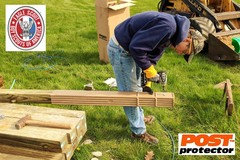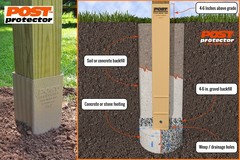How can you treat wood to be used as fence posts?
jgs2
19 years ago
Featured Answer
Sort by:Oldest
Comments (12)
calliope
19 years agoaka_peggy
19 years agoRelated Professionals
Danbury Landscape Architects & Landscape Designers · Waunakee Landscape Architects & Landscape Designers · Willowick Landscape Architects & Landscape Designers · McKinney Landscape Contractors · Bethel Park Landscape Contractors · Tewksbury Landscape Contractors · Vashon Landscape Contractors · West Haverstraw Landscape Contractors · Winchester Landscape Contractors · Greenfield Landscape Contractors · Quincy Decks, Patios & Outdoor Enclosures · Holland Roofing & Gutters · Lancaster Roofing & Gutters · Chicago Ridge Roofing & Gutters · Dunwoody Roofing & Guttersgrittymitts
19 years agojoepyeweed
19 years agoUllisGarden
19 years agopotty
19 years agocacho
19 years agoallan_lindh_gmail_com
12 years agorbbutler67
8 years agoSherwood Botsford (z3, Alberta)
8 years agoken_mcdonnell
5 years ago
Related Stories

EDIBLE GARDENSSee How a Practical Garden Can Be a Visual Treat, Too
A university edible garden overflows with ideas for growing produce and flowers in containers, beds — or a pickup truck
Full Story
MATERIALSShould You Use Composite Timber in Your Landscape?
This low-maintenance alternative to wood is made from varying amounts of recycled plastic. Consider it for decks, fences and more
Full Story
GARDENING AND LANDSCAPINGCreate Nests: Treat Yourself to a Protected Walkway
Turn a garden path into an exploration of inviting nooks and beautiful views
Full Story
LIFEThe Polite House: How Can I Kindly Get Party Guests to Use Coasters?
Here’s how to handle the age-old entertaining conundrum to protect your furniture — and friendships
Full Story
KITCHEN DESIGNYes, You Can Use Brick in the Kitchen
Quell your fears of cooking splashes, cleaning nightmares and dust with these tips from the pros
Full Story
ARCHITECTUREStyle Divide: How to Treat Additions to Old Homes?
One side says re-create the past; the other wants unabashedly modern. Weigh in on additions style here
Full Story
KITCHEN DESIGNWhat to Know About Using Reclaimed Wood in the Kitchen
One-of-a-kind lumber warms a room and adds age and interest
Full Story
ORANGETreat Your Rooms to Pumpkin Pie Orange
Stir some pumpkin colors into your interiors for design deliciousness that lasts well beyond Thanksgiving
Full Story
FENCES AND GATESA Deer Fence Can Be Decorative as Well as Protective
You need a monster-size fence to shelter your garden from deer, but it doesn’t have to look like a monstrosity
Full Story
SHOP HOUZZHouzz Products: Treat Your Rooms to Orange and Black All Year
It’s no trick. Furnishings and accessories in this bold color pairing keep spaces lively even after Halloween is over
Full Story












Central Valley Fence